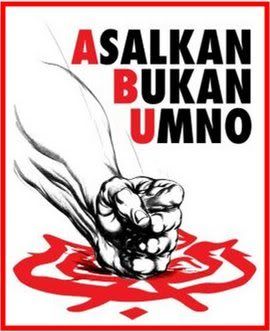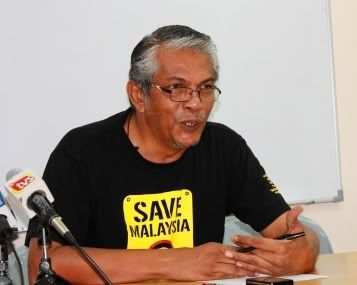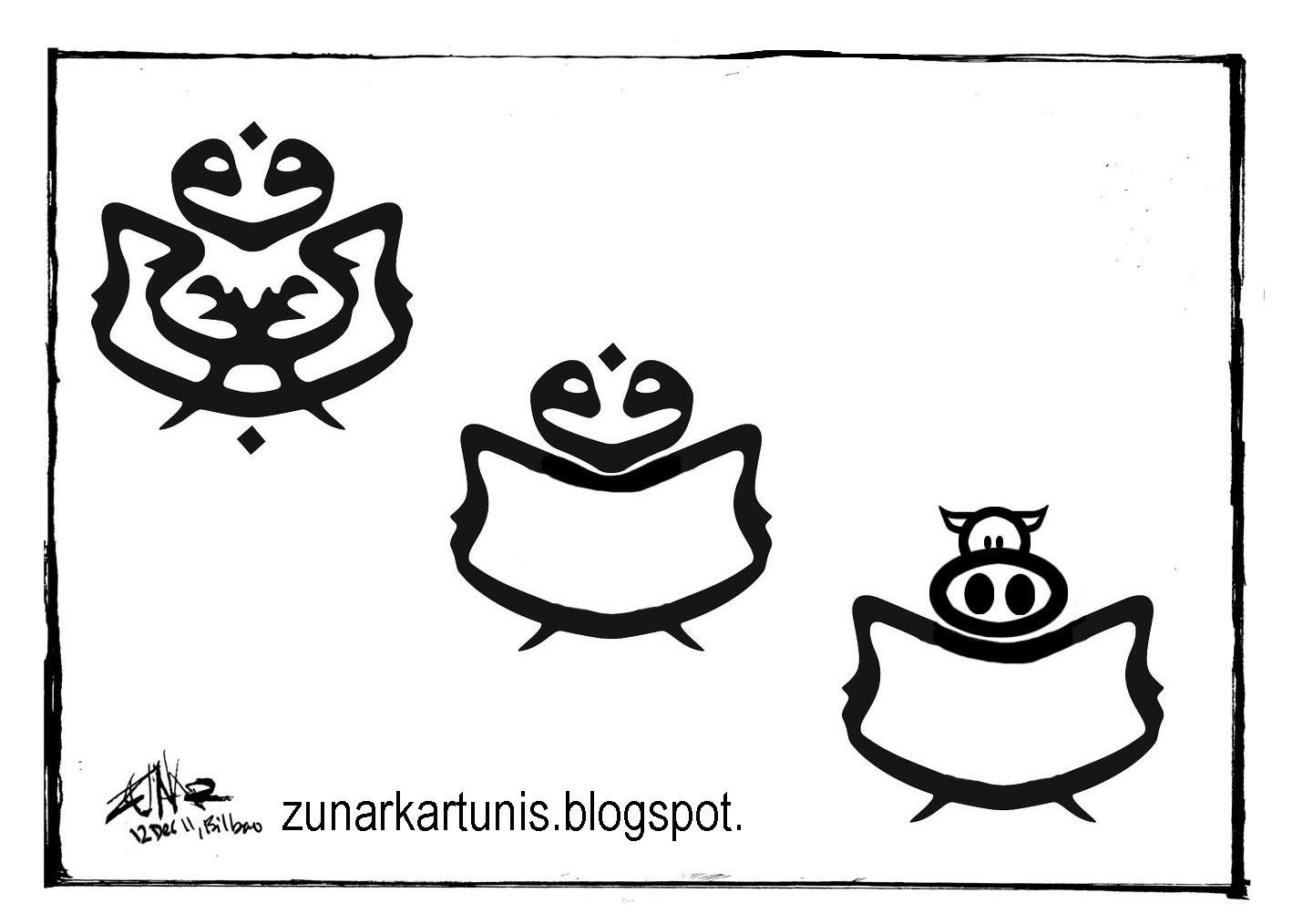Post-901 A.B.U. teeter-totter blues…
Technorati tags: Malaysia, Politics, ABU, Anything But UMNO
Anyone expecting a lull in the hyperactive Malaysian political scene once 901 was out of the way must be disappointed. In fact, knowing the nature of the beast, the word ‘lull’ doesn’t exist in the Malaysian political vocabulary.
Unless you’ve been living under a rock lately – but not the fake type the MI-6 planted in Russia – you’d probably have come across the acronym A.B.U. at some point.
 It stands for Asal Bukan UMNO or Anything But UMNO, an initiative trying to ensure that come the next General Elections (GE13), the Malaysian people revoke the card blanche given to the party for the last half a century.
It stands for Asal Bukan UMNO or Anything But UMNO, an initiative trying to ensure that come the next General Elections (GE13), the Malaysian people revoke the card blanche given to the party for the last half a century.
Granted, the argument against such kinds of initiatives is usually that UMNO’s rule is by virtue of its cooperation with other component parties within Barisan Nasional (BN), everyone knows who really calls the shots.
As with any initiative that’s political in nature, ABU has its supporters and detractors. It wouldn’t be Malaysia if that weren’t the case.
But before he states his stand on A.B.U., Walski would like to share a back-and-forth exchange between two prominent personalities, both of whom he knows personally…
(ABU this, ABU that, and what Walski’s own stand is, in the full post)
The two personalities Walski refers to are Anas Zubedy and Haris Ibrahim. This past week, there was an exchange between the two gentlemen about A.B.U., with Anas stating why he did not agree with it, and Haris explaining why the initiative was important.
You can find the exchange in the following (in chronological order):
- Why I disagree with ABU (via Free Malaysia Today)
- Why I disagree with Anas Zubedy (via The People's Parliament)
- A note to Haris Ibrahim (via Free Malaysia Today)
- Dear Anas (via The People's Parliament)
First off, allow Walski to express his opinion that the above is the way to have a disagreement on something. Articulately, without going into ad hominem rhetoric, something that's unfortunately all too typical of a lot of 'Net discourse these days.
 In summary, Anas’ initial points were that he disagreed with the assumption that everyone in UMNO is bad, and the notion of the need to get rid of UMNO wholesale.
In summary, Anas’ initial points were that he disagreed with the assumption that everyone in UMNO is bad, and the notion of the need to get rid of UMNO wholesale.
Anas’ standpoint is that a representative should be voted based on the individual’s merit and not based on his or her party affiliation.
Much has been commented about why Anas is taking this stand, including insinuations that his main reason is to protect his rice bowl.
Walski won’t comment on what these commenters think, as the criticism seems to be based more on their suspicion about Anas’ motives. The Anas Walski knows is a centrist, who always prefers the middle ground, a stand he tries to articulate with his opposition to A.B.U..
 On the other hand, Haris Ibrahim is of the opinion that UMNO has been given too much leeway, and in the process has used their position in power to their own benefit. More specifically, to the benefit of the elite within the party, not necessarily the general membership Melayu types.
On the other hand, Haris Ibrahim is of the opinion that UMNO has been given too much leeway, and in the process has used their position in power to their own benefit. More specifically, to the benefit of the elite within the party, not necessarily the general membership Melayu types.
And while Haris doesn’t exactly say outright that all and sundry within UMNO are bad people, he does make a valid point in stating that the inaction and silence of the “good people” against the actions of their party that can and have been construed as being less than savory puts them in a position of collusion. A case in point, the Peaceful Assembly Bill.
Haris has been consistent in his stand on numerous issues over the years that Walski’s known him, and his stand on why ABU is an important initiative doesn’t surprise Walski one iota.
So, you’re probably wondering right about now where Walski stands in all this. Before he clears that question up, allow him to share something that writer (and Walski’s Facebook friend) Kee Thuan Chye wrote, which was subsequently published by Free Malaysia Today.
Umno is beyond redemption. At its general assembly in December, the message it sent out was suspicion of others and hatred for them, and a desperate desire to win the next general election.
Its president, Najib Tun Razak, once again proved what many of us have long suspected – that he is a dissembler. He exposed the ultimate lie behind his 1Malaysia slogan by saying things that would divide the races rather than bring them together. He set the trend for delegates at the assembly to harp on the threats to Umno from other races. It was disgraceful coming from the prime minister of the country. It was supremely irresponsible.
Worse, two days after the assembly ended, he appealed to the right-wing NGO Pertubuhan Kebajikan dan Dakwah Islamiah Malaysia (Pekida) for support. This has to be the final nail in the 1Malaysia coffin.
To cap it all, Umno showed its partiality to cronyism by defending Wanita leader Shahrizat Abdul Jalil over the scandal surrounding her family’s business, the National Feedlot Corporation. One or two colleagues called for her to step down, but the overwhelming majority stood by her and castigated the opposition for exposing the scandal.
This begs the question: Can Umno change? As the major party in the Barisan Nasional (BN) government, can it truly stand up for other races as well, and work for their well-being? Can it stay clear of corrupt practices? Can it stop dishing out favours and projects to party leaders and their cronies? Can it save Malaysia from financial meltdown or will it rather bleed our coffers dry?
(source: Free Malaysia Today)
Read the rest of the essay. It articulates quite closely why Walski supports ABU.
Can UMNO change? And if it can, what will it transform into?
Thus far, the transformation that Najib has touted seems to be more rhetoric than reality. In fact, it’s like a game of bait and switch – lure us into believing that his party can transform itself, and then find out UMNO has indeed transformed, but into something uglier and nastier instead. The Najib administration can best be described as one making few steps forward, but several more steps in retreat.
When the 901 verdict was announced, Najib was quick to proclaim that the verdict cleared BN (read: UMNO/BN) of any conspiracy claims.
Datuk Seri Najib Razak has called rival Datuk Seri Anwar Ibrahim’s acquittal over a sodomy charge today an exoneration for the political conspiracy claims hurled at the Barisan Nasional government.
“Today’s verdict shows once again that, despite what many have claimed, the Malaysian judiciary is an independent institution where neither politics nor politicians have any influence over the dispensation of justice,” the prime minister was quoted as saying by Bernama Online today.
The prime minister added the ruling in favour of the opposition leader was testimony of his administration’s adherence to the tenet of separation of powers.
(source: The Malaysian Insider)
A wiser politician would have taken this small “victory” and move on to bigger and better reforms, as promised. Regardless of how his own party felt.
True, the prosecution has the right of appeal, a right which was exercised at literally the eleventh hour. It’s the timing that raises questions, as does the filing of another acquittal appeal (via The Malaysian Insider), involving another prominent opposition figure, Karpal Singh. Both appeals were filed on the same day.
 Personally, Walski does think the speculation that Najib has relented to the wishes of UMNO (via The Malaysian Insider) has merit. He bases this on what’s been ‘said’ by UMNO’s voice on the Internet, the legion of Unit Media Baru (or UMB, UMNO’s ‘Net warrior division, so to speak). The tone exhibited since even before the trial began in February 2010 indicates that the UMB were promoting the idea that Anwar was guilty, regardless of what evidence would surface.
Personally, Walski does think the speculation that Najib has relented to the wishes of UMNO (via The Malaysian Insider) has merit. He bases this on what’s been ‘said’ by UMNO’s voice on the Internet, the legion of Unit Media Baru (or UMB, UMNO’s ‘Net warrior division, so to speak). The tone exhibited since even before the trial began in February 2010 indicates that the UMB were promoting the idea that Anwar was guilty, regardless of what evidence would surface.
And since the UMB is a sanctioned organ of UMNO, it is therefore reasonable to surmise that UMB reflects the party as a whole, and the party wants Anwar Ibrahim out of the nation’s political picture. Similar case with Karpal Singh. The real reason may not be known, but Walski suspects that UMNO is indeed afraid of any strong opposition. And indications are that UMNO’s opposition is indeed gaining traction.
And then there’s the scandals.
The National Feedlot Corporation (NFC) Cowgate saga is but the most recent of scandals related to those closely associated with BN. And Walski suspects that it won’t be the last.
Tycoon Tan Sri Syed Mokhtar Al-Bukhary will be allowed to take full control of Proton through a mandatory general offer after Khazanah Nasional Berhad announced today the sale of its 42.7 per cent stake in the national carmaker to DRB-Hicom for RM1.3 billion.
In a statement today, Khazanah said its stake would be sold to DRB-Hicom for RM5.50 per share or RM1.291 billion, subject to approval of the latter’s shareholders.
“Upon completion of the sale and purchase agreement, DRB-HICOM will be obliged to undertake a mandatory general offer on the remaining PROTON shares,” Khazanah said.
Khazanah managing director Tan Sri Azman Mokhtar called the sale a significant milestone in moves to place government-linked companies (GLCs) on a more competitive footing.
(source: The Malaysian Insider)
Is this another scandal in the making? Khazanah (which for all practical purposes is taxpayer-funded) selling off Proton at an apparent loss to a GLC very closely linked to UMNO (via Malaysians Must Know the TRUTH). Nevermind the mumbo-jumbo crypto-math that Khazanah has used to justify that the divestment was actually profitable.
Scandal or not, it certainly is a favor-ridden business deal given to a party-linked crony. And if Proton still cannot hold its own after this, then what? Another bailout?
UMNO has pretty much ruled Malaysia since day one of Malaya’s formation in 1957, through the Alliance initially, and today through Barisan Nasional (BN). That’s 54 years of rule.
Many within the party – as evidenced by the vibes Walski gets from the UMB fellers – feel that UMNO ruling the country is the only acceptable scenario. It has pretty much become a given. Worse, it has become, to many in the party, almost a God-given right.
In imposing that right, religion is naturally brought into the picture. From what Walski reads from the UMB, the real religionists we need to be afraid of are those from UMNO. In their rhetoric, the UMB belittles PAS for not implementing hudud. And since the UMB speaks on behalf of UMNO, don’t be surprised if UMNO seem to be the ones really championing hudud and an Islamic state, something PAS has all but officially abandoned.
And will we really see the repeal of draconian laws, such as the ISA, as promised by Najib last year? Walski would really have liked to give the man the benefit of the doubt. Until he read this (emphasis by myAsylum):
Laws should not be amended if they are seen to be in the interest of the people, Datuk Seri Najib Razak said today.
The prime minister said laws should be retained if society says they should be maintained.
He was responding to a statement by Opposition Leader Datuk Seri Anwar Ibrahim in an interview with a foreign television station recently on the need to amend laws which he perceived as archaic.
(source: The Malaysian Insider)
Indications are that the promise of repeal may remain just that – a promise. One that is not kept, since “public interest” in this country is generally not determined by the people per se, but by some people with vested interests.
And more often than not, these some people are UMNO-affiliated, in one shape or form.
Granted Malaysia is finally no longer in a state of emergency, something we’ve apparently been in for a long period of time, much longer than the actual emergencies decades ago. And for that, Walski will give Najib credit.
Well, Walski is a "part of society", too, and he thinks that these draconian laws should be done away with. And he is certain that a significant portion of society feels the same way. UMNO does not the entire society make, and he knows very well the opposition those within the party have against repeal.
But you know, give any political party or coalition 54 years, and in all likelihood you’ll get what Malaysia has today with the UMNO-led BN. Should there come a day when BN no longer rules, Walski does hope the coalition becomes an effective opposition, just so that the required checks and balances in a democracy are kept in place.
So, why does Walski support ABU? It is for the aforementioned reasons, and one other very crucial one – as long as UMNO/BN rules, there will always be a Malay agenda, a Chinese agenda, Islamic agendas, Indian agendas, allegations of Christian agendas, and what not.
But there will never be a sincerely championed Malaysian agenda. And that is the real-political implication of UMNO continuing to be in power, as far as Walski is concerned.
The 1Malaysia initiative is wonderful rhetoric, but the reality is that it is more rhetoric than a sincere Malaysian agenda. Perkasa, and an “I am Malay first” future PM waiting in the wings are some proofs Walski has to offer.
And that is why he supports the Anything But UMNO initiative.
Anas Zubedy may have made a valid point in saying that we should always vote a suitable candidate and not vote based on the party a candidate is affiliated with. In a more perfect democracy, that may be true. Malaysia’s democracy is far from perfect, and at times, appears to not even look like a democracy.
Once elected, that candidate, no matter how credible or otherwise, becomes a spokesperson for his or her party. That’s the reality of Malaysian politics as it stands today.
Until that changes, and an MP can truly represent his or her constituents without having to kow-tow to party wishes, the only way to ensure UMNO is no longer given a blank check to govern is to vote them out of government.
Hence A.B.U., and why Walski’s stand pertaining to it.
Finally, here’s a response to A.B.U. – an ugly incident that happened last night in Klang. Oddly enough, Selangor police claim that this did NOT happen (via Free Malaysia Today).
YouTube sure has an uncanny way of capturing and displaying things that never happened. It must have technology to tap moving images from our deepest, darkest, and most mischievous sub-conscious.
Need Walski say anymore?

















